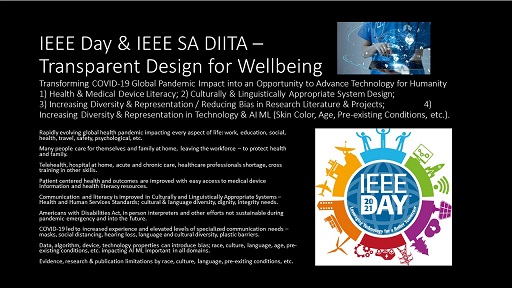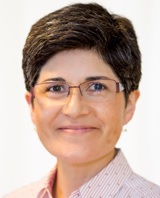IEEE Day 2021 Event 'Health & Justice for All' Transparent Design for Wellbeing
IEEE Day 2021 Event 'Health & Justice for All' Transparent Design for Wellbeing PACE SIGHT Group & DIITA Workflow

An IEEE Day 2021 Event. 'Health & Justice for All.' Celebrate with the Section, Computer Chapter, PACE SIGHT Group & Digital (Dignity) Inclusion, Identity, Trust & Agency (DIITA) new Workflow 'Transparent Design for Wellbeing' discussion about 'Do Good Things Health & Justice for All,' a continuation of the previous project, 'Do Good Things Justice for All' incorporating lessons from COVID-19, including planning for resilience. This excellent project will provide many opportunities for IEEE Members, students, community members, stakeholders to Volunteer and to do good things to advance technology for humanity. Team members will discuss their topics; attendees are encouraged to participate in the discussion. Members, stakeholders, students are encouraged to volunteer, reach out to schools, other community volunteer organizations, technical society members, and others and to participate in the SIGHT Group, and or the IEEE SA DIITA Group.
Paula Muller, PhD will begin the discussion. We will describe Alzheimer's disease and other dementias as an example of the complexity and the importance of health literacy, accessibility, and culturally and linguistically appropriate systems.
1 in 3 older adults dies from Alzheimer's disease and other dementias. During COVID-19, Alzheimer’s and dementia deaths have increased by 16%. In New Jersey, this number was 20% higher than average.
The main risk factor is age. One in nine people age 65 and older (11.3%) has Alzheimer's dementia. Almost two-thirds of Americans with Alzheimer's are women. Older Black Americans are about twice as likely to have Alzheimer's or other dementias as older Whites. Older Hispanics are about one and one-half times as likely to have Alzheimer's or other dementias as older Whites.
In summary, because of the prevalence of the disease, and the importance of early diagnosis, education of all population is imperative. Family members, as well as patients, need to be educated, culturally and linguistically appropriate systems are necessary to support everyone affected, and as the disease progresses and it becomes more difficult to communicate verbally with the persons living with the disease, other mechanisms need to be developed.
Preparation for the IEEE SA DIITA Workflow - Transparent Design for Wellbeing 1Q 2022 Guided Round Table: 1) Health & Medical Device Literacy; 2) culturally & linguistically appropriate system design; 3) increasing diversity & reducing bias in technology & AI ML technology; 4) increasing diversity & reducing bias in research, research literature, & projects.
Resilience planning for the future from lessons learned during COVID-19. Group inclusion & accessibility Pilot solution connecting people to improve Health & Medical Device literacy as an example for the IEEE SA DIITA Workflow.
Needs: People must monitor & care for themselves & family at home, with telehealth, in clinic, for chronic, acute & emergency health conditions. Solution: Easy to use Medical Device guides, w Languages, expanded Lexicon/vocabulary, Closed Captioning (CC), screen readers, uses iii. Information and Communications Technology (ICT) to connect iv. Medical Devices.
United Nations Sustainable Development Goals 3, 4 & 10 during a global pandemic, and in preparation for a resilient future. Connects people quickly to Medical Device user guides, related health condition, literacy materials Culturally and Linguistically Appropriate Systems CLAS-HHS to improve health literacy.
Training Community of Interest (CoI): patients, caregivers, disabled, those with preexisting conditions, ambulance corps, first responders, stakeholders, standards volunteers, trainees, healthcare professionals, during telemedicine session, etc.
Pilot demonstrates connecting medical devices (thermometer, bp cuff, pulse ox, scale, glucose meter, etc.) using a simple technology solution, machine/ human readable code GUDID & database with user instructions, health condition monitoring, and emergency procedure, by levels of literacy, English, Spanish, Closed Captioning, & Blind Screen Reader.
Community Lived Experience Profiles Storytelling, Lexicon Standards & collaborations to reduce Bias in data & algorithms, to improve healthcare for minorities, underrepresented, women, children, etc. Connects People & Medical Devices to Internet of Things (IoT).
Online open access Pilot includes multimedia Seminars in English, Spanish, Closed Captioning, Blind Screen Reader, Events: Seminar - Alzheimer’s Community Educator; Interviews/Storytelling with Community Members & professionals Ambulance Corps, Students, Trainees, etc. Shared on IEEE TV, Social Media, Blogs, publications, conferences, etc.
Date and Time
Location
Hosts
Registration
-
 Add Event to Calendar
Add Event to Calendar
Loading virtual attendance info...
- Contact Event Hosts
- Co-sponsored by TK Srinivas
Speakers
 Dr Paula Muller
Dr Paula Muller
Health & Justice for All
During the COVID-19 emergency, it became clear that timely and comprehensive access to intelligent technology and a connected lifestyle should not be considered discretionary but compulsory for every human being. Successful systems will be culturally and linguistically appropriate. Systems will accommodate people's needs regarding aging, mobility, hearing, vision, and level of expertise. Since a rising number of people care for themselves and also care for their loved ones, it became clear that people need connectivity to one another, to timely information to remain safe, and to resources. To improve wellbeing, easy access to health and medical device literacy is needed for individuals and for professionals. Our technology humanitarian project, 'Health & Justice for All' connects people to health and medical device information in a culturally and linguistically appropriate form for individuals and caregivers, community members, volunteers and professionals.
Biography:
Paula Muller, PhD, Biomedical Engineer, is a Humanitarian, IEEE SA DIITA Workflow and SIGHT Volunteer. Paula has been involved with IEEE NJ Coast Section PACE SIGHT Group since the very beginning, and is an innovator on the IEEE SA DIITA Transparent Design for Wellbeing workflow, and the 'Health & Justice for All' project. She is a leader, inspired innovator, and role model making significant ongoing contributions to the community locally and globally including but not limited to: Sociavi (her company), IEEE HAC Event, ‘Hear, Here!,’ IEEE SIGHT Project, ‘Do Good Things: Justice for All,’ improving communication for those with hearing loss, PACE SIGHT ‘Inventing Your Future,’ collaboration helping people become Inventors, IEEE Women’s History Month Roundtable at Stevens Institute of Technology, is an author on an upcoming Springer Chapter: 'TAP and Intelligent Technology for Connected Lifestyles -- Trust, Accessibility, and Privacy.'
Paula Muller, Founder of Sociavi, has a lifelong passion for technology applied to healthcare, starting with her M.S. in Biomedical Engineering in Chile working with the blind, then her work in Switzerland analyzing EEGs to prevent epileptic seizures, followed by her Ph.D. and Post-doc work at Rutgers with Parkinson patients, and later at Authentidate with Telehealth products and services. Paula is Certified Alzheimer’s Disease & Dementia Care Training (CADDCT) and Certified Dementia Practitioner (CDP), and volunteers as bilingual Community Educator for the Alzheimer's Association.
The concept of Sociavi evolved from her professional background as well as her strong commitment to family relations and lifetime connections. Thus SOCIAVI was born, meaning in Latin to “share” and “unite”, with the goal of keeping those aging in place and their families connected and closer together. Our specifically designed, touch screen communication device, the Sociavi C2M (Connect To Me), provides the users with a “small appliance”, that is simple to operate and easily integrates into their daily life. Simplicity is the Cornerstone of Sociavi: No Login, No Password, No Username, No Account Setup. Just a 13 inch screen hands free device simple to navigate along with an array of brain fitness activities that stimulate and soothe the mind.
Paula and her company were awarded two patents from the USPTO in 2020 on the methods and devices for a Communication System for Use with Protected Persons. IEEE SIGHT Volunteer Graham C. Alig, Patent Agent, worked closely with Paula to achieve these goals.
At Sociaci we are proud to give Peace of Mind to families and caregivers through our Sociavi C2M that allows families to connect with their Loved Ones Far, Near, Simply and Globally.
Agenda
Meet & Greet to Celebrate IEEE Day 2021
Introduce Health and Justice for All Transparent Design for Wellbeing
Team Members discuss their Topics
Interactive Discussions
Planning for Guided Round Table 1Q 2022
IEEE Day 2021 Event 'Health & Justice for All' Transparent Design for Wellbeing PACE SIGHT Group & DIITA Workflow

